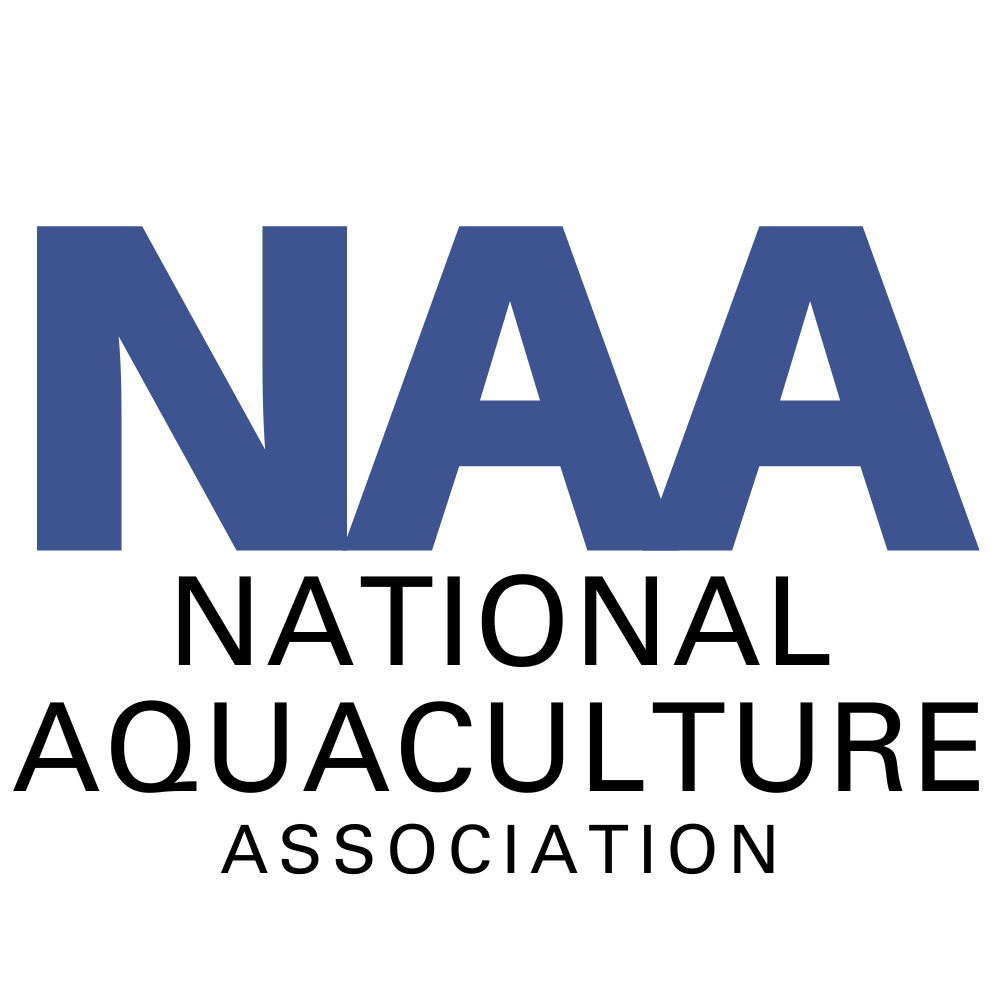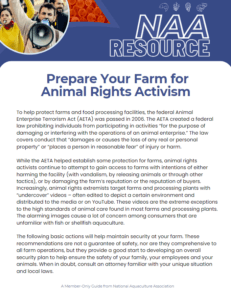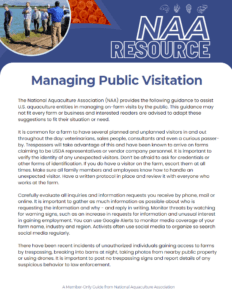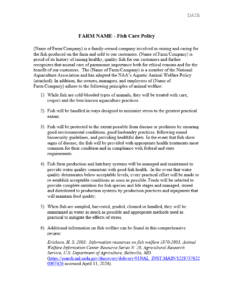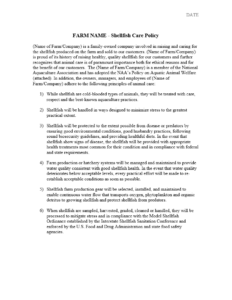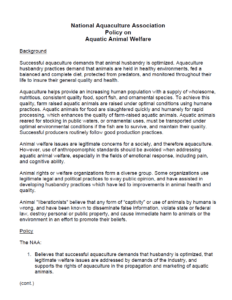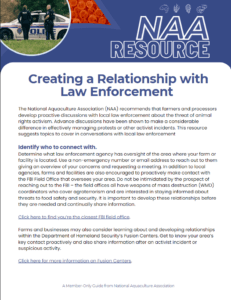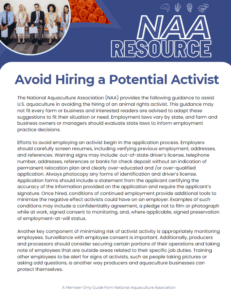Animal welfare and animal rights organizations are increasingly targeting aquaculture farms and processors in the United States.
Animal welfare and animal rights organizations are pursuing anti-aquaculture legislation, organizing protests on farms, and covertly infiltrating farms as both visitors and employees.
Animal rights activists typically attempt to capture and distribute images and written or verbal comments to create public revulsion towards animal agriculture.
Farms and processing plants should re-examine or adopt hiring, farm visitation, and farm biosecurity policies to address these tactics to factually present all that you do to nurture your aquatic animals throughout their lifetime.
Aquaculture Resources to Prepare for Animal Rights Activism
The following resources will provide a good start to developing an overall security plan to help ensure the safety of your family, your employees and your animals.
When in doubt, consult an attorney familiar with your unique situation and local laws. Take preventative actions now and be ready should these organizations ever target your business.
For any of the following topics, contact your aquaculture extension specialist, aquatic animal veterinarian or health professional, or the NAA for additional guidance.
Credit: Sarasota Herald-Tribune
Example Media from
Anti-Aquaculture Groups
Washington State Bans Octopus Farming
Aquaculture: A Sea of Suffering
Organic Caviar Farms: Fish Still Suffer

Watch NAA's Webinar: Tips and Updates from the Animal Agriculture Alliance
Maintain Facility Security
- Lock office doors and file cabinets.
- Have firewalls installed on your computer systems.
- Maintain separate business and personal computers.
- Keep all animal health products under lock and key.
- Have proper lighting, motion detectors, security cameras, and locks or key code access on gates and doors.
- Maintain fencing and gates in good condition and post signs indicating restricted areas, no trespassing, etc.
- Ensure access to the facility is controlled.
- Establish check-in procedures for visitors.
- Place appropriate signs noting such procedures and require visitors to sign in and out upon entering and leaving facility.
- Use visitor identification badges - even the stick-on kind is better than nothing. This protects your visitor as well as your operation.
- Escort visitors (especially reporters and photographers/videographers) at all times.
- Instruct employees to report all unescorted visitors to the appropriate management and security personnel immediately.
Animal Welfare Guidance
- A farm animal welfare statement communicates to the public your caring attitude and recognition animal care is a central tenet of your operations.
- The NAA suggests downloading and editing the draft Fish or Shelllfish Care Policy to best represent your farm and values.
- Prominently post the policy statement at your business.
- Require employees to review and sign that they will implement your Care Policy principles.
- Talk with the public and the media about your operation’s best practices.
- View NAA’s Media and Public Interaction resource for more information.
- Train all employees that will interact with animals on proper animal care or handling procedures, including what to do if animals are sick or just uncooperative.
- Make it known you practice zero tolerance regarding animal mistreatment and that you will prosecute to the full extent of the law, if necessary.
- Have all employees review and sign that they understand your companies policies.
- Download NAA’s Employee Acknowledgement form template.
Working with Law Enforcement
- Talk seriously with your local police/fire/emergency departments now. Get to know the people whose job it is to protect you, your loved ones and your property. Let them know you’re prioritizing your facility’s security and be sure to report any eco or animal rights criminal activity.
- It is imperative you know whom to call if necessary.
- Know response times.
- Know how many officers are on duty during early morning hours, prime time for ‘hits’ on rural facilities.
- Provide law enforcement with a map of your facilities.
- Be sure to indicate service shut-off locations, security areas, and any area of sensitivity or vulnerability.
- Report all suspicious and/or illegal incidents to local police.
Employee Best Practices
- Thoroughly screen all job applicants. Take the time to check all references. If you have any questions, ask for further references. Double-check anyone who shows a university or college ID. Any hesitation to provide additional references or documentation by the prospective employee should be a red flag and likely take them off your hire list.
- Tell all employees at hiring that unannounced locker checks, etc. are part of your routine security maintenance operation and that you will report and/or prosecute any employee who breaks the law.
- Watch for unusual behavior by new employees or workers who have no reason to be in the facility past their regular shift.
- Ask seasoned employees to be your “eyes and ears” for anything unusual and have them report suspicious behavior to you.
- Inform employees in vulnerable areas that surveillance or infiltration is a possibility. Any suspicious activity should be reported to supervisors or the appropriate security personel immediately.
- Ensure all employees are familiar with your policies regarding animal care,
environmental stewardship, employee care and overall social responsibility.
Remember, they have lives away from your business (school, church, soccer fields, etc.) and will likely be asked questions by individuals in your community.
Establish a Biosecurity Plan
Create and implement a farm biosecurity plan. If you already have one in place, consider reviewing and updating it.
A biosecurity plan is focused on reducing risk of introducing disease to, within and from your farm. A major component of that plan should be to restrict the movement of visitors to the farm or processing plant and to restrict employees to their assigned areas of responsibility. Clearly described and posted notices of visitor and employee access restrictions can assist in identifying visitor or employee intentions of conducting unauthorized actions.
Visit NAA's Farm Biosecurity resource page for more information, templates and webinars about aquaculture biosecurity.
Vigilant Communication Policies
- In all cases, designate a single spokesperson to handle all calls, including media, about animal care, animal rights or any company policy relative to animals. Also, conduct tests of your security system and if necessary, mock drills on your response program, including media statements, etc.
- Evaluate every request for information about your farm, even the most routine. Don’t fall prey to false praise - never agree to a suspicious request until you have verified the validity of the request.
- Whenever possible, require requests for sensitive information/tours be in writing.
- Never provide information over the phone (it can be misinterpreted or misconstrued).
- Always reply in writing. Obtain as much information as possible, e.g. name, phone number, address, reason for request, what will the person be doing with
the information, who else may have been contacted, etc. - Ask for references. Make a call to verify the person requesting any sensitive information is who they say they are, especially those claiming to be reporters.
- Ask if you may receive a copy of the final report once it is completed. If the person hesitates to cooperate with any of these requests, refuse them
access to your operation or information about your operation.
- Watch for warning sign that you may be a target. General patterns include:
- An increase in requests for animal specific information or on-farm tours.
- Calls/letters questioning or criticizing your business or particular practices.
- Harassing calls/letters - perhaps not to your farm but one near you; increase in media attention to issues relating to US aquaculture.
- Special interest group campaigns locally.
- Unusual interest in gaining employment, especially in roles involving animal
handling.
- Develop a crisis communication/action plan.
- Establish policies and procedures for handling disruptive, illegal situations as well as for handling adverse publicity that might result from the misuse of
information. - Your priority is to keep you and your employees safe. Take care of people, then move on to ways to protect bricks and mortar.
- Establish policies and procedures for handling disruptive, illegal situations as well as for handling adverse publicity that might result from the misuse of
Please keep in mind this information is provided for informational purposes only.
Seek individualized, professional legal advice prior to implementing these practices to ensure compliance with legal standards and contact local law enforcement if you anticipate protests. Learn your rights and protections under local, state or federal law.
Do not hesitate to contact the NAA with
questions or comments at (251) 504-6995 or
naa@nationalaquaculure.org
